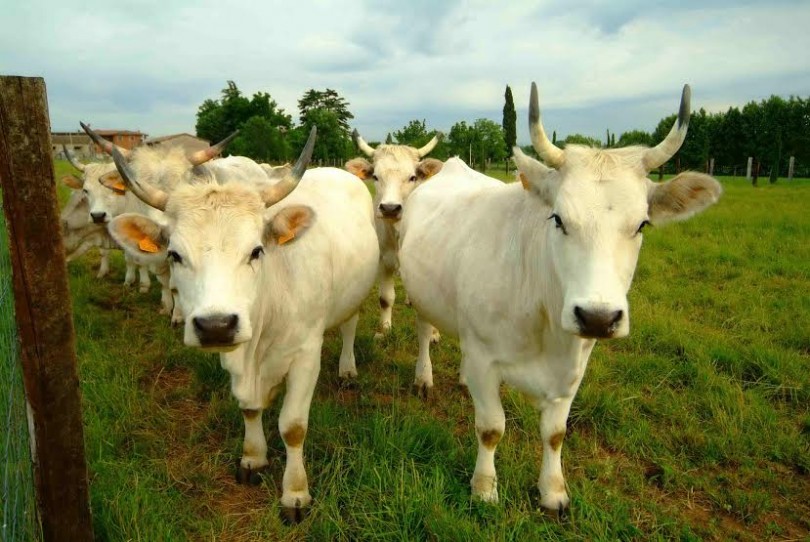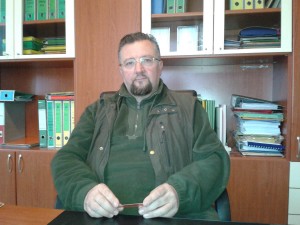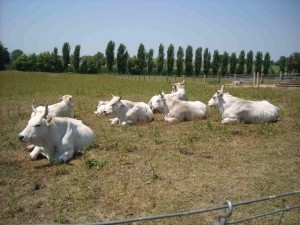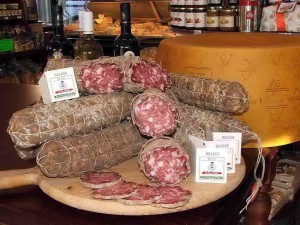It ‘s a long family story: his grandfather was a merchant of Romagna oxex in Pozzolengo, a village in the Lake Garda country which once hosted a veri big cattle market; dad, who was also intimately tied to the land, began as a mediator of animals and in ’62 acquired his first factory, which have been joined by other two in the 70s. Today, the Fattorie Dei Colli Storici in Pozzolengo still pursue the ancient vocation under the guidance of Massimo Castrini, who has become a little bit of a Garda “guru” of high quality meat: its production chain focused exclusively on native Italian breeds was supported by Slow Food, for which he also became a teacher for a Meat and Salami master, while with his project on ethical consumption and the exploitation of the so-called “Quinto Quarto” he has toured half Italy, teaching chefs and housewives how to cook snubbed but very tasty cuts as liver , sweetbreads, kidneys, nerves, tripe and tail.
“I have created over 30 recipes to show that you could do haute cuisine with cuts that are nearly forgotten by consumers – says Massimo -. From here it began the relationship with some groups of consumers who unite to buy together quality food directly from the producer: we now serve a thousand families with a direct delivery project open list that starts from the concept of ethical consumption to get directly into the homes of consumers without any intermediary. ”
Shortening the chain is indeed the mission that the Fattorie dei Colli Storici have always pursued from the start, channeling the product directly to the end consumer by focusing exclusively on the rearing of typical Italian races. Hence the closed chain concept pursued by Castrini, which starts from the suckler cow to reach the final product sold on the counters of the farm shop in Pozzolengo (opened by his father): most of the breeding is focused on the Piedmontese breed, with a small group of Chianina and one of Romagnola for a total of about 450 animals.
“Most of the nurses are in Piedmont, where in summer they are brought to graze freely at high altitude pasture: I withdraw the calves only after six to seven months of breastfeeding by the mother. This means we are beyond the methods of the biological specification, which provides three months. And this also means more healthy animals, that do not need drugs because they have a powerful charge of antibodies. They are slaughtered between 18 and 20 months: in the meantime, they enjoy a diet that comes largely from our own fields, planted with corn, alfalfa and ryegrass. About 30% of production is sold in the shop in Pozzolengo: the rest to a cooperative in Piedmont and to the buying groups “.
But the store is also known for its choice meats, such as the famous Salame Morenico Pozzolengo De.Co.
“I launched it myself after discussing it with mister Luigi Veronelli, the great italian gastronome which was a bit of a father for these Municipal Designations oe De.Co. as we call them, and since then it has gone very well – says Castrini -. We have given an identity to a product that has always been made in the area: a very balanced sausage, with a slight hint of garlic which is not present in the dough, rather thin with a share of 25% fat and an average seasoning of 90 days. In other words, a sausage for the whole meal. ”
And now Castrini, after so many years of dedication to the world of meat, is going to give rise to a new adventure.
“This year I will launch my first wine, a Lugana – he says -. I planted seven hectares of vineyard three years ago, and in 2015 we made the first harvest and we are now ready with the first bottles that we will present at Vinitaly 2016, launching with my wife a new company that will carry my name. A new challenge, to diversify the activities in the name of a wine that I love so much”





Leave a Comment